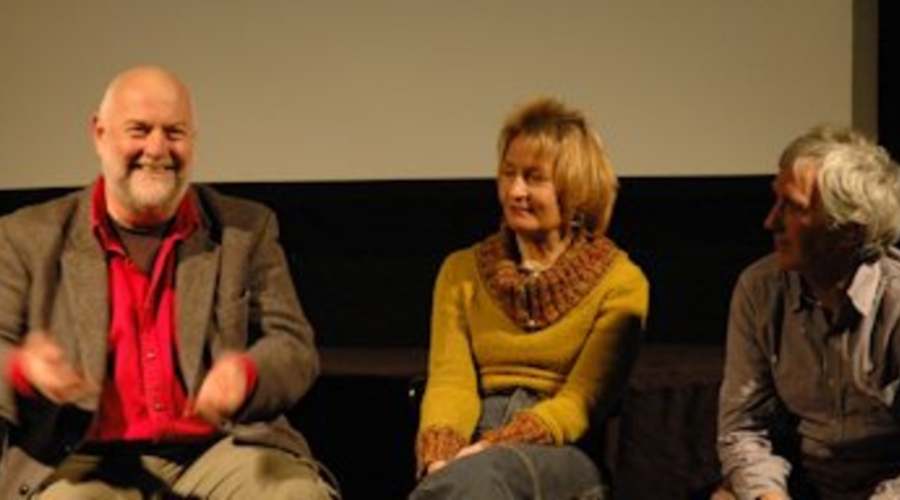The Amber collective is always able to surprise. One description made of it during this presentation seemed especially apt: "Amber is one long-running experiment."
That comment was made by Graeme Rigby, one of three members who shared their memories and opinions in between screenings of a few of their many works. Chris Phipps chaired the event, where Graeme, Sirkka-Liisa Konttinen and Peter Roberts made up the Amber Panel.
Left to right Graeme Rigby, Sirkka-Liisa Konttinen and Peter Roberts
Despite a commitment to shared decision-making, the name of the group was decided on a chance whim. When debate failed to settle on an agreed name, Graeme registered the name which has become so familiar after spotting Amber Ale.
The name has since been linked with award-winning films for BBC TWO and Channel Four, as well as a rich archive of photographs and films capturing often-ignored elements of life in the North East of England.
One vital ingredient referred to by all speakers was their commitment to giving their projects plenty of time — time to get to know a local area, to meet potential actors and volunteers and hear their stories. Time to let a storyline and storyboard develop, through discussion, argument and improvisation.
One unexpected consequence of that was the willingness of the collective to embark on what appeared to be big spending. A pub and horses are examples. For 'Seacoal', their first drama (from which an excerpt was shown) a fishing boat was bought.
Graeme Rigby explained that this helped win over local people who might otherwise be wary of involvement. "They knew you were serious — so they'd choose to bring something to you." The economic argument was also strong — rather than spending £1K a day in boat hire, £14K bought freedom from a time limit on the production — and the boat was sold afterwards.
Another film excerpt showed how past filmmaking did suffer one constraint on this luxury of time. That constraint was the cost of stock used before video and digital technology brought far cheaper costs of shooting. 'Launch' was the very first production, featuring wonderfully framed images from shipbuilding at the end of a street. Current producers would be amazed to find it was shot on a ratio of two-to-one…there was just a thousand feet of 16 mm film stock, which was used in a wind-up Bolex.
This discipline helped foster the dedication to craft skills which lies at the heart of Amber's approach. No shot could be filmed without consideration of options — the lack of today's pan and zoom options meant the camera operator had to move to select the best framing. The wild track had to be recorded separately, creating more awareness of audio selection.
The same detailed involvement is shown by the photography projects. Sirrka described her many years gathering images and audio to illustrate common ownership of the beaches, in 'Writing in the Sand'. Her current study of Newcastle's Byker estate is likely to take five years; her previous Byker photography lasted for seven years.
Nevertheless, the team welcomed the advantages of newer technology, which Peter described as "much more plastic". The process allows more versions, more of a chance for the debate which Amber values.
Their challenges today lie as ever in ensuring sufficient funds to pursue their Amber vision of filmmaking, photography and exhibition. But Graeme was clear: "We prefer smaller budgets and freedom to big budgets."
The fascinating breadth of work produced by Amber cannot be done justice in one article or one presentation. Their website at www.amber-online.com is strongly recommended as a way to study the background and view clips. DVDs can be ordered and exhibitions are staged regularly at The Side.

